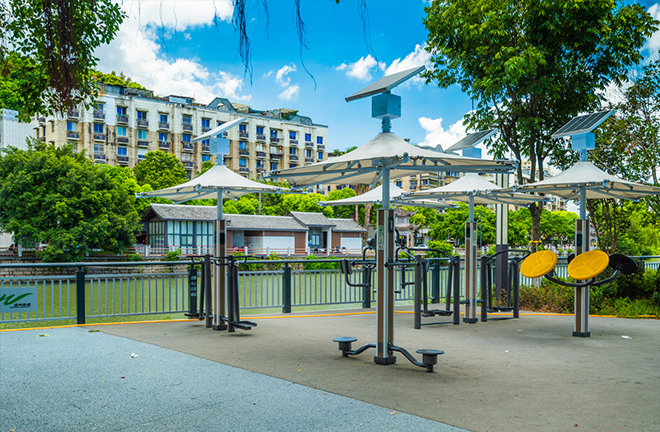Exploring socioecological approach to enhancing urban residents’ well-being

Fitness facilities in an urban residential community Photo: TUCHONG
Chinese President Xi Jinping once said that the cities are built by the people and are for the people. This statement profoundly reveals the dynamic and close interactions between a city and its residents, and highlights the significance of such interactions to a city’s development.
As fundamental units of social ecology, cities play an important role in shaping individual identities and fostering a sense of belonging to a region or culture. Social ecology studies the interactions between people and their environments and how these interactions shape and constrain human behavior. Exploring the socioecological path to enhancing urban residents’ well-being requires a systematic analysis of the various potential interaction patterns between cities and their residents.
Mutual interactions
Cities and their residents form an interdependent socioecological system of interactions. First of all, cities use policy and regulation adjustments to attract and select resident groups. Since 2016, many regions in China have introduced new hukou [household registration] policies. In order to enhance their competitiveness, certain cities have relaxed residency requirements to enhance their attractiveness, while others have gradually tightened their talent settlement policies to optimize their talent structure.
In a similar vein, individuals choose to settle, temporarily reside, or leave cities based on their personal preferences. This choice is reflected in national population census data, revealing patterns of population mobility over time. For example, comparing earlier census data with that of the most recent one, the seventh national census, shows a shift from a mere influx into first-tier cities to aggregation within urban agglomerations, with some first-tier cities even reporting reverse population flows in recent years.
In addition, cities and their unique historical heritage, regional characteristics, natural climate, along with other factors give birth to urban culture, while urban culture and urban residents are closely integrated and shaped by each other.
Moreover, urban residents play a vital role in propelling urban development. This is not only reflected in the professional field, but also more broadly in everyday life. For instance, residents’ environmentally-oriented behaviors, such as garbage sorting and energy conservation, can improve the urban environment and facilitate the sustainable use of resources. The higher the residents’ recognition of their city’s culture, the more inclined they are to promote their city to the outside world, which in turn increases the city’s fame and influence.
Well-being of urban residents
US psychologist Carol Dweck identifies three basic human needs: a need for acceptance, a need for competence, and a need for predictability. Building a socioecological environment that meets these needs can help improve the well-being of residents.
In order to fulfill the need for predictability, cities should provide a highly stable social environment. This can be achieved by establishing transparent information platforms that clearly and promptly communicate city policies, plans, and project updates, allowing residents to clearly understand the city’s development trajectory. Furthermore, cities should also create effective channels of communication with residents, ensuring suggestions and complaints are addressed in a timely and effective manner.
To meet residents’ needs for acceptance, cities should offer a diverse social environment. For example, it is advisable to create communities that integrate people from diverse geographical areas as well as ethnic and occupational backgrounds, and to encourage cultural exchange. Formulating a sound policy for housing security is also an important measure to maintain the stability of residents’ living conditions.
Meeting residents’ needs for competence requires platforms and channels for personal development. This involves actively attracting and and nurturing businesses to create more employment opportunities and ensure stable incomes. Cities should also prioritize investment in educational resources and offer diverse educational opportunities, encouraging residents to develop their competence and pursue lifelong learning.
Residents’ participation
It is mutually beneficial for residents to actively participate in urban development. However, two prerequisites need to be met. First, residents must develop a strong sense of identification with the city in which they live. Second, cities need to establish an effective feedback and incentive mechanism to form a virtuous cycle of “participation-evaluation and feedback-incentive-re-participation.”
Residents’ identification with their city is central to urban cohesion. There are many ways to solidify this sense of identity, such as creating distinct city branding, establishing common goals and values between residents and the city, and reinforcing common attributes among urban dwellers. Each city possesses unique charm and characteristics, which can be highlighted and strengthened through both long-term cultural accumulation and short-term urban activities.
Cities can implement various measures to encourage residents to participate in urban development. First, they should empower residents to take an active role in building their families and communities. Second, cities should establish community discussion platforms, leveraging the internet and new media to enhance transparency and efficiency in decision-making processes. Third, community activities should be increased to promote exchanges and cooperation among community residents. Fourth, the government should play a crucial guiding and organizing role. For example, after field research on enterprises, targeted education and training programs should be developed to provide funding and policy support for innovation, while avoiding a blind pursuit of short-term results.
Zhang Xiaoxiao is an associate professor from the School of Psychology at Shenzhen University.
Edited by YANG LANLAN

 PRINT
PRINT CLOSE
CLOSE